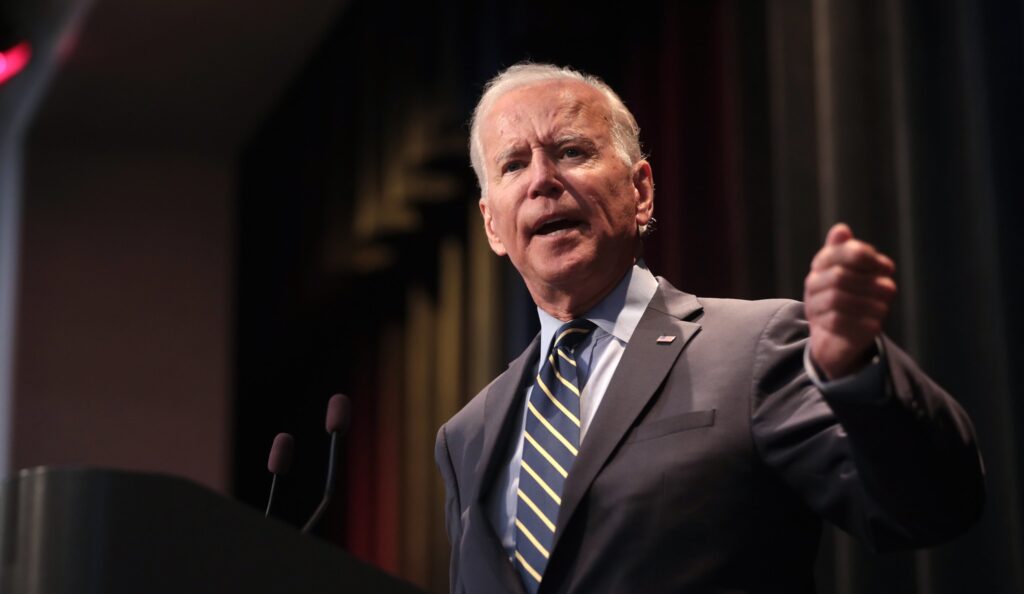

On 28 April 2021, President Joe Biden marked the eve of his first 100 days in office with his first address before a joint session of Congress. Typically delivered every January or February as the State of the Union address, Biden’s speech outlined his Administration’s early response to the COVID-19 pandemic and efforts to rebuild the nation’s economy and institutions.
Biden discussed the Administration’s progress on the American Rescue Plan – from USD 1,400 relief checks to Operation Warp Speed vaccine distribution, rental assistance to loans for struggling small businesses, special enrolment in the Affordable Care Act to healthcare for veterans, and measures for addressing the opioid crisis to cutting child poverty in half by the end of 2021. He highlighted the over 1.3 million jobs created during his first 100 days, as well as the IMF’s assessment that U.S. economic growth will exceed 6 percent this year – the fastest it’s been in nearly 40 years.
Jobs and Infrastructure
Biden mapped a comprehensive American Jobs Plan to be led by Vice President Kamala Harris. The plan would:
- Invest in transportation infrastructure – roads, bridges, highways, ports, airports, rail corridors, and transit lines;
- Strengthen “Buy American” provisions initiated by the previous Administration;
- Provide clean water and improve children’s health by replacing all lead pipes;
- Develop high-speed internet connectivity, especially for the 35 percent of rural Americans still without internet access;
- Build a modern, resilient, and fully clean power grid invulnerable to storms, cyber attacks, and catastrophic failures;
- Invest in women workers and elderly and child caregivers;
- Support the right to unionize by ratifying the Protecting the Right to Organize (PRO) Act;
- Federalize the USD 15 minimum wage;
- Pass the Paycheck Fairness Act to address the gender pay gap; and
- Get 800,000 families off the Medicaid waiting list.
- Biden also urged the National Institutes of Health (NIH) to establish an Advanced Research Projects Agency devoted to healthcare innovation, reminiscent of the Defense Advanced Research Projects Agency (DARPA) overseen by the Pentagon.
Education
Biden proposed the American Families Plan to be led by First Lady Jill Biden. The plan would:
- Provide access to good education by funding 4 additional years of public education (2 years each of fully subsidized preschool and community college), as well as Pell Grants and other investments in historically Black, Tribal, and other minority-serving higher institutions;
- Ensure quality, affordable childcare through guaranteeing that low- to middle-income families need only allocate 7 percent of their income for high-quality care for children up to the age of 5;
- Legislate up to 12 weeks of guaranteed paid family and medical leave;
- Provide USD 3,000 child tax credits to families with children over 6 and USD 3,600 for children under 6, and extend the credit system through 2025; and
- Permanently lower premiums for 9 million enrolees under the Affordable Care Act.
Immigration
Biden encouraged Congress to undertake comprehensive immigration reform. The Administration’s immigration objectives include:
- Ratifying the S. Citizenship Act of 2021 establishing new policies for a secure border, a pathway to citizenship for undocumented individuals, and efforts to address the root causes of migration from Central and South America;
- Passing federal legislation in 2021 to secure protection for “DREAMers”; and
- Permanent protections for immigrants on temporary protected status from countries beset by violence or disaster.
Taxes
Biden also urged substantive reforms to the U.S. tax system. In particular, he decried a system that unfairly benefits corporations and the ultra-wealthy and urged sensible changes that force all Americans to “pay their fair share.” Significantly, his tax plan calls for:
- No tax increases on people making less than USD 400,000 in income;
- Reforms to the corporate tax system, including closing tax havens, loopholes, and deductions that enable offshoring jobs and shifting profits overseas;
- Increasing the tax rate to 39.6 percent for the wealthiest 1 percent of Americans making over USD 400,000; and
- Eliminating loopholes allowing Americans making over USD 1 million to pay lower capital gains taxes.
Foreign Policy
Finally, Biden issued several significant remarks regarding America’s engagement with the world, that signalled:
- A strengthened commitment to democracy and human rights at home to counter autocracy and injustice overseas;
- The need for a U.S. foreign policy that benefits the middle class;
- American leadership and cooperation with allies that prioritizes terrorism, nuclear proliferation, mass migration, cyber security, climate change, and pandemics;
- Punitive countermeasures for unfair trade practices, such as subsidies for state-owned enterprises, intellectual property thefts, and forced technology transfers; and
- Competition with China where necessary to defend U.S. interests, while also avoidance of outright conflict with Beijing.
What Companies Should Do
As the Biden Administration activates its policy agenda for 2021 and beyond, companies – especially those in the tech sector – should carefully consider how their priorities align with the President’s worker and social justice-oriented economic prescriptions. Companies should:
- Identify and secure federal funding opportunities provided by the Administration’s jobs and infrastructure plans;
- Socialize and expand private sector investment in the Administration’s education and workforce development plans;
- Engage and educate their local Representative or Senator, as well as other members of Congress and staffers, to up-sell an industry viewpoint regarding the Administration’s intended tax increases; and
- Determine other areas of common interest between companies and consumers to secure buy-in from public-minded regulators and other policy stakeholders in the Administration.